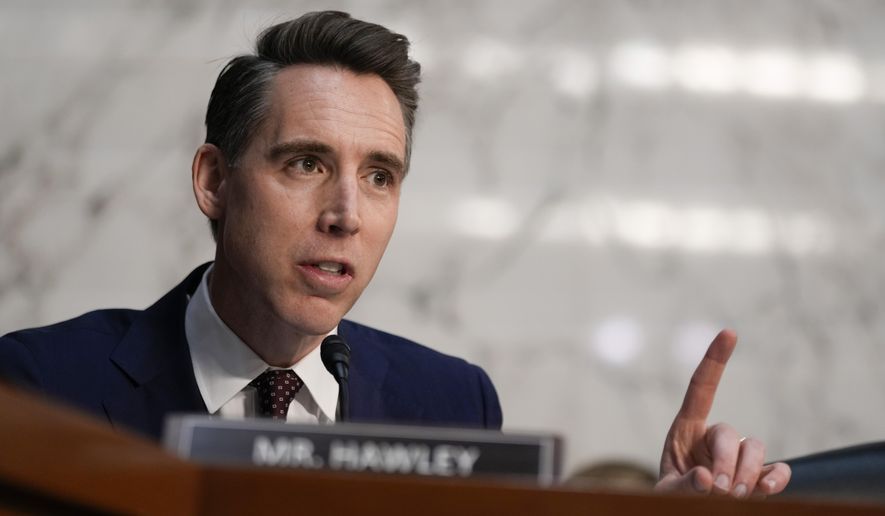OPINION:
Sen. Josh Hawley is on a political island. The Republican lawmaker from Missouri continues to flirt with unwise policy proposals that are typically reserved for those on the left. Diverse ideas are welcome within the conservative movement, but so, too, is pointed debate. Mr. Hawley is missing the mark by a mile.
His latest policy fumble is his support of more than doubling the federal minimum wage. In June, Mr. Hawley introduced legislation that would increase the national wage floor to $15 an hour. Tellingly, the position parrots a choir of Democrats but scant few Republicans.
During their short-lived 2020 presidential runs, Democratic Sens. Elizabeth Warren of Massachusetts and Cory Booker of New Jersey pledged support for a $15 minimum wage. Rep. Alexandria Ocasio-Cortez, New York Democrat, argues that anything below $15 is “utterly embarrassing.” Self-described democratic socialist Bernie Sanders of Vermont backs an even higher $17 hourly earnings floor.
These big government comrades are not known for making sound policy decisions. As Republicans and even some Democrats have rightly argued, raising the federal minimum wage can hurt the very workers the policy is intended to help. Although some people may experience a pay bump, the majority of economists agree that drastic government-mandated wage hikes lead to shrinking employment opportunities and shuttered businesses.
Mr. Hawley attempted to justify his uneconomic proposal with a line out of the populist progressive playbook: If “corporations…can afford to pay their CEOs millions, they can afford to pay working Americans a decent wage.” He is doubly wrong: A company’s profit margins, not its size, are a better indicator of its ability to absorb increases in labor costs. More importantly, federal data shows that it’s small businesses with fewer than 100 workers that employ a majority of the minimum-wage workforce, not large corporations.
Mr. Hawley’s adventurism to the left is not limited to wage policy. Earlier this year, he introduced legislation that would import European-style price controls for medicine. He specifically aims to leverage government power to peg the cost of prescription drugs in America to the amount that people in countries like the United Kingdom, France and Canada pay.
The approach sounds fair in theory, but the devil is in the details. European countries, as well as our northern neighbors, have health-care systems in which the government micromanages medicine prices. Yes, the bureaucratic scheme artificially lowers drug costs in the short run. But it also guts economic incentives to develop — and supply — modern lifesaving treatments for the future.
To fully enter a market, drugmakers must reasonably believe they can recoup billions of dollars to cover research and development investments. It’s akin to General Motors factoring in both design and manufacturing costs when selling the Silverado. European price controls throw cold water on this dynamic.
That is why it can take years for new treatments, therapies or vaccines to become available in Europe. And when products do finally arrive, the region faces frequent shortages because in a government-controlled system, supply does not meet demand. The USC Schaeffer Center rightly described the consequences of a Hawley-style approach as “everyone loses.”
In March, Mr. Hawley also poked American workers in the eye. He cosponsored the Faster Labor Contracts Act, which gives unions the upper hand in labor negotiations. The proposal would institute a rushed timeline for deliberations between unions and employers, which could leave workers with a bad deal. It also pushes a one-size-fits-all labor contract with provisions that are decided upon by unelected bureaucrats.
Mr. Hawley has also called the Protecting the Right to Organize (PRO) Act “a pretty good piece of legislation” and won the backing of major labor unions like the Teamsters, who want to see this bill become law. But the legislation is a laundry list of anti-worker policies, including a provision that would reclassify our country’s independent workers as W-2 employees, threatening the livelihoods of countless Americans.
Labor union membership is circling the drain because Americans are rightly discovering that the benefits of joining do not outweigh the heavy baggage. For years, donations distributed by unions have almost entirely funded Democrats in hopes of laws that will help to slow the bleeding. Mr. Hawley’s proposals are examples of these Band-Aids.
The modern Republican Party is welcoming of bold ideas, but not borrowed ones. Sen. Hawley is a smart and capable politician. He should be wise enough to know a good public policy from a harmful one.
• Michael Saltsman is an owner and partner at Berman and Company.




Please read our comment policy before commenting.